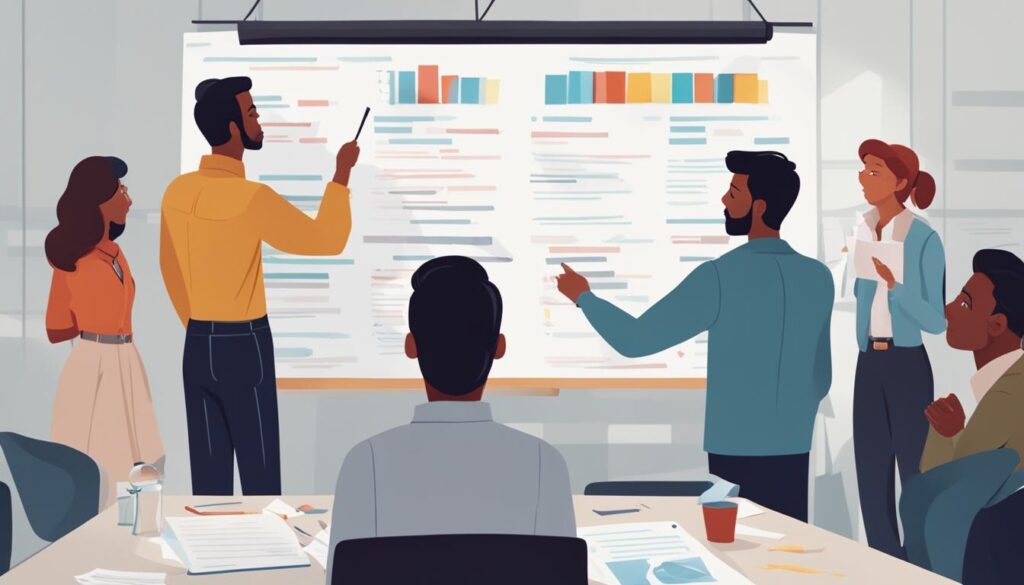We may earn money or products from the companies mentioned in this post.
In today’s fast-paced business landscape, networking events have become a crucial part of building professional connections and driving success. Successful networking events require careful planning and coordination to ensure that attendees can network effectively and that business goals are met. In this guide, we will explore the key aspects of Networking Event Planning, event management, and corporate event planning, providing insights into how businesses can leverage networking events for growth.
Key Takeaways:
- Networking events are important for driving business success through professional connections.
- Effective networking event planning requires careful attention to details and coordination.
- Corporate event planning companies can assist businesses in executing successful networking events.
- Measuring the success of networking events through KPIs and metrics is crucial in understanding their impact on business objectives.
- The attendee experience can be enhanced through strategic event design that incorporates innovative and creative elements.
Understanding the Fundamentals of Networking Event Planning
Professional networking and business events are essential elements of corporate growth. Effective event planning services can help organizations maximize the potential of these events and create lasting impressions on attendees. In this section, we will explore the fundamentals of networking event planning and the importance of reliable event planning services.
Professional networking is a crucial aspect of business development, contributing to lead generation, partnerships, and knowledge sharing. Networking events facilitate meaningful connections between professionals and enable businesses to expand their networks.
Various kinds of business events exist, such as conferences, seminars, trade shows, and product launches. Each event type offers unique benefits to businesses, ranging from knowledge sharing to lead generation and increased brand awareness.
Engaging event planning services can ensure seamless coordination and execution of networking events, allowing businesses to focus on their objectives. These services include managing event logistics, selecting venues, coordinating catering, managing registrations, and providing audio-visual equipment.
Strategies for Effective Networking Event Coordination
Networking event coordination involves managing a variety of tasks and responsibilities to ensure the success of the event. Event organizers play a crucial role in this process, overseeing various aspects of event logistics and ensuring that everything runs smoothly.
Key Responsibilities of Event Organizers
The key responsibilities of event organizers include:
- Choosing the appropriate venue
- Managing registration and attendee list
- Arranging for catering and other amenities
- Coordinating transportation and accommodations
- Ensuring adequate staffing for the event
- Overseeing technical support for equipment and technology
Event organizers must ensure that all aspects of the event are taken care of, from the initial planning stages to the actual execution of the event. This involves working closely with vendors and service providers to ensure that everything is in order.
Importance of Event Logistics
Effective event coordination requires careful attention to detail and a thorough understanding of event logistics. This includes:
- Understanding the needs of attendees
- Ensuring adequate space and seating
- Creating a clear and logical event schedule
- Managing technical requirements and equipment
- Dealing with emergencies and unexpected situations
By focusing on event logistics, event organizers can ensure that the event runs smoothly and that attendees have a positive experience. This, in turn, can lead to better networking opportunities and more successful outcomes for businesses.
Effective Communication among Event Organizers
Effective communication is essential for successful networking event coordination. Event organizers must work closely with each other and with vendors to ensure that everyone is on the same page and that nothing is overlooked.
“Communication is key to effective event coordination. Event organizers must be able to communicate effectively with each other and with vendors to ensure that everyone is working towards the same goals.”
Regular check-ins and meetings throughout the planning process can help to ensure that everyone is aware of what needs to be done and that any issues are addressed promptly. By fostering effective communication, event organizers can ensure that the networking event is a success.
Key Steps in Planning and Executing a Networking Event
Networking events are essential for connecting professionals, fostering business relationships, and driving growth. Planning and executing a successful networking event requires careful consideration of various elements, from setting clear objectives to creating a budget, timeline, and selecting a venue. To ensure seamless event management, businesses often rely on the expertise of event planning companies.
Setting Clear Objectives
Before planning a networking event, it is essential to set clear objectives. Defining the purpose and intended outcomes of the event will help guide decisions regarding event logistics, budget allocation, and marketing efforts. Examples of event objectives include:
- Introducing new products or services
- Generating leads and cultivating business relationships
- Facilitating knowledge sharing and industry insights
- Building brand awareness and reputation
Creating a Budget
Creating a budget is a critical step in event planning. It sets the financial boundaries for the event and helps determine what aspects of the event are prioritized. Budget considerations include:
- Venue rental and catering costs
- Speaker fees and travel expenses
- Marketing and promotional materials
- Audiovisual equipment and technology
Developing a Timeline
Creating a timeline is crucial to ensure all aspects of the event are executed smoothly. The timeline should include:
- Key planning milestones and deadlines
- Marketing and promotional schedules
- Event setup and logistics
- Registration and check-in procedures
The Role of Event Planning Companies
Event planning companies specialize in creating and executing successful networking events. They can assist in all aspects of event management, including:
- Venue selection and negotiations
- Event promotion and marketing
- Registration and attendee management
- On-site event coordination and logistics
By partnering with an event planning company, businesses can ensure a successful networking event that meets their objectives and exceeds attendee expectations.
Maximizing Engagement and Networking Opportunities
Professional networking events offer a unique opportunity for businesses to connect with potential clients, partners, and employees. However, without effective engagement strategies, it can be challenging to foster meaningful connections among attendees.
Creating Interactive Sessions
One way to maximize engagement during networking events is by creating interactive sessions that encourage attendees to participate actively. This could include activities such as speed networking, group discussions, or breakout sessions focused on specific industries or topics.
“Networking is not about just connecting people. It’s about connecting people with people, people with ideas, and people with opportunities.” – Michele Jennae
Such sessions can facilitate meaningful conversations and encourage attendees to exchange ideas and insights, which can lead to long-lasting business relationships.
Fostering a Conducive Environment
Event organizers play a crucial role in fostering a conducive environment for professional networking. By creating a warm and welcoming atmosphere, attendees are more likely to feel comfortable approaching new contacts and discovering new business opportunities.
Organizers can also facilitate networking by creating opportunities for attendees to connect outside of the formal event. This could include arranging post-event drinks or dinners for attendees to continue the conversation and build on the relationships they formed during the event.
Leveraging Technology
Technology can also play a significant role in enhancing networking experiences. Event organizers can leverage social media platforms to connect attendees before, during, and after the event, creating a sense of community and promoting ongoing engagement.
Additionally, event apps can provide attendees with real-time updates on event schedules, speaker bios, and opportunities for engagement. Such tools can help attendees navigate the event and identify promising business opportunities they might have otherwise missed.
Enhancing the Attendee Experience through Strategic Event Design
Strategic event design is key to enhancing the attendee experience and making networking events memorable. By incorporating elements of creativity and innovation, businesses can create an engaging environment that fosters stronger connections and relationships.
One of the most critical aspects of event design is venue selection. The venue should be easy to access and have the necessary equipment and facilities to accommodate attendees. The layout planning should also promote interaction and networking. For instance, round tables are better than rectangular tables as they facilitate conversations between attendees. Additionally, planners can create designated spaces for networking or informal chats, which can help encourage attendees to connect outside of structured sessions.
Creating an engaging event program is also essential. Planners should design sessions that are interactive and keep attendees engaged. For instance, sessions that involve group discussions, breakout sessions, or Q&A can provide opportunities for attendees to connect and share insights. Additionally, incorporating technology such as live polling or gamification can make sessions more interactive and fun.
Table
| Element | Objective |
|---|---|
| Venue Selection | Easy access, necessary facilities, and equipment to accommodate attendees, the layout plan should support interaction and networking. |
| Engaging Event Program | Interactive sessions, group discussions, breakout sessions, Q&A, live polling, and gamification to make sessions more interactive and fun. |
Lastly, event planning services can help bring event design to the next level. Planners can work with event management and event coordination teams to ensure that every aspect of the event is flawlessly executed. By enlisting the help of experienced professionals, businesses can create an immersive and interactive event experience that attendees will remember for years to come.
Measuring the Success of Networking Events
Corporate event planning and management rely heavily on assessing the success of networking events to track the return on investment (ROI) and identify areas for improvement. Effective event logistics and coordination go hand-in-hand with measuring the event’s performance to determine its impact on the organization’s business objectives.
Key performance indicators (KPIs) help quantify the networking event’s success. These metrics provide insights into the event’s overall performance, attendee engagement, feedback, and ROI. Common KPIs for measuring networking events include:
- Attendance rate and demographics
- Engagement rate and session participation
- Lead generation and follow-up opportunities
- Surveys and feedback questionnaires
By tracking these KPIs, event organizers can evaluate the success of their event and justify the event’s ROI. For example, if the lead generation rate is high, the event is successful in creating business opportunities. Similarly, positive attendee feedback indicates a successful networking event, which can result in long-term business relationships.
An effective way to measure the success of networking events is by using event technology solutions. Event management software provides real-time data and analytics that help track event performance and attendee engagement. It enables event organizers to manage event logistics better and make data-driven decisions about the event’s success.
Conclusion
In conclusion, mastering networking event planning is vital for driving success and building a professional community. By understanding the fundamentals of networking event planning and implementing effective strategies, businesses can leverage the power of networking events to achieve their goals.
Event planning services and coordination play a crucial role in successful networking events. Reliable event organizers can provide valuable insights and support, ensuring seamless event logistics and execution.
Enhancing the Attendee Experience
Creating a memorable attendee experience is a key aspect of successful networking events. Through strategic event design, businesses can enhance engagement and foster meaningful connections. Choosing the right venue, planning the event layout, and developing creative event programs are all crucial elements of strategic event design.
Measuring Event Success
Measuring the success of networking events is essential to understanding their impact on business objectives. Key performance indicators and metrics, such as attendee feedback and business outcomes, can provide valuable insights into the ROI of networking events.
Overall, networking events are a powerful tool for business growth and development. By mastering networking event planning and leveraging the support of event planning services, businesses can drive success and build lasting professional relationships.
FAQ
What is networking event planning?
Networking event planning involves the organization and management of events specifically designed to facilitate professional networking and business connections. It includes tasks such as venue selection, logistics coordination, program development, and attendee engagement.
Why are networking events important for businesses?
Networking events provide opportunities for businesses to expand their professional networks, build relationships, and generate new leads. They offer a platform for exchanging ideas, exploring collaborations, and staying updated on industry trends, ultimately driving business growth and success.
What types of business events are commonly organized?
Common types of business events include conferences, seminars, trade shows, networking mixers, workshops, and industry-specific events. Each type of event serves a different purpose but all aim to facilitate connections and provide valuable learning and networking opportunities.
How can event planning services assist in successful networking events?
Event planning services have expertise in organizing and executing events, including networking events. They can handle logistics, manage registrations, coordinate with vendors, and ensure smooth operations, allowing businesses to focus on networking and achieving their event objectives.
What are some strategies for effective networking event coordination?
Effective networking event coordination involves careful planning and execution. Strategies include setting clear goals and objectives, creating a detailed timeline, selecting appropriate venues, managing registrations efficiently, and providing engaging activities and sessions for attendees to facilitate networking opportunities.
How can networking event organizers maximize attendee engagement?
Networking event organizers can maximize attendee engagement by creating interactive sessions, facilitating meaningful connections through icebreakers and networking games, incorporating technology such as event apps or matchmaking platforms, and providing opportunities for attendees to share their expertise and experiences.
What is the role of strategic event design in enhancing the attendee experience?
Strategic event design focuses on creating an immersive and impactful experience for attendees. It includes elements such as venue selection, layout planning, thematic decorations, engaging event programs, and incorporating innovative technologies. These elements help create a memorable experience that fosters meaningful connections among attendees.
How can the success of networking events be measured?
The success of networking events can be measured through various key performance indicators (KPIs) and metrics. These can include attendee feedback surveys, lead generation, business partnerships formed, ROI calculation, attendee satisfaction ratings, and tracking any specific objectives set for the event.
Why is mastering networking event planning important for businesses?
Mastering networking event planning is important for businesses as it enables them to create valuable connections, generate leads, stay updated on industry trends, and foster collaborations. By effectively planning and executing networking events, businesses can maximize their growth potential and achieve their goals.
Affiliate Disclosure: This post may contain affiliate links. If you purchase through our link, we may receive a small commission, but at no additional cost to you. For more information, please see our Disclosure statement.



